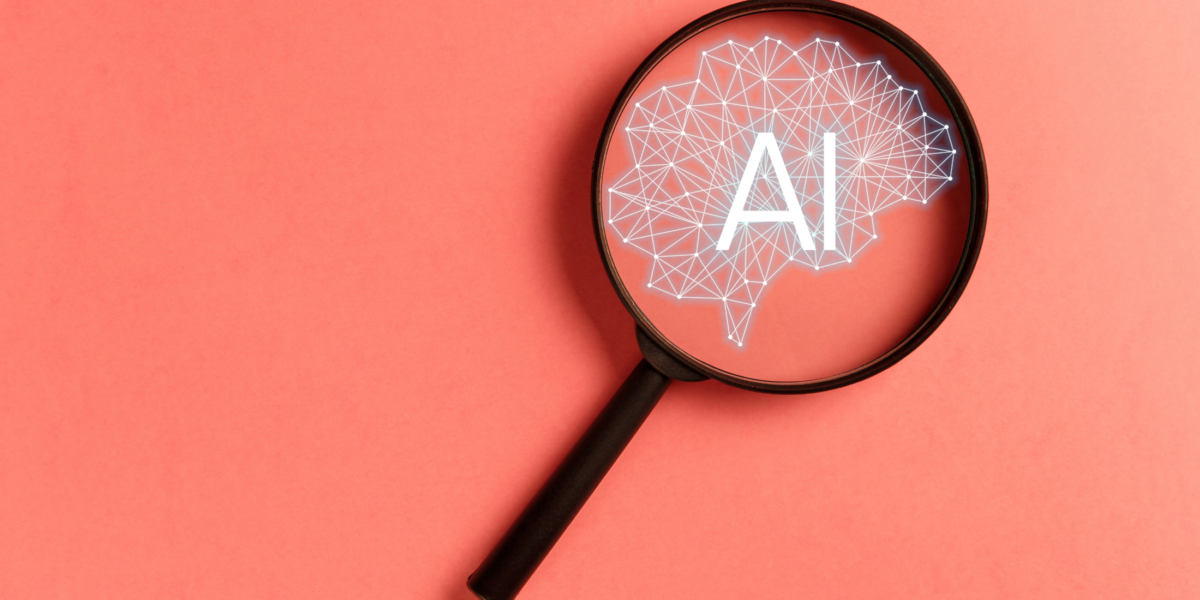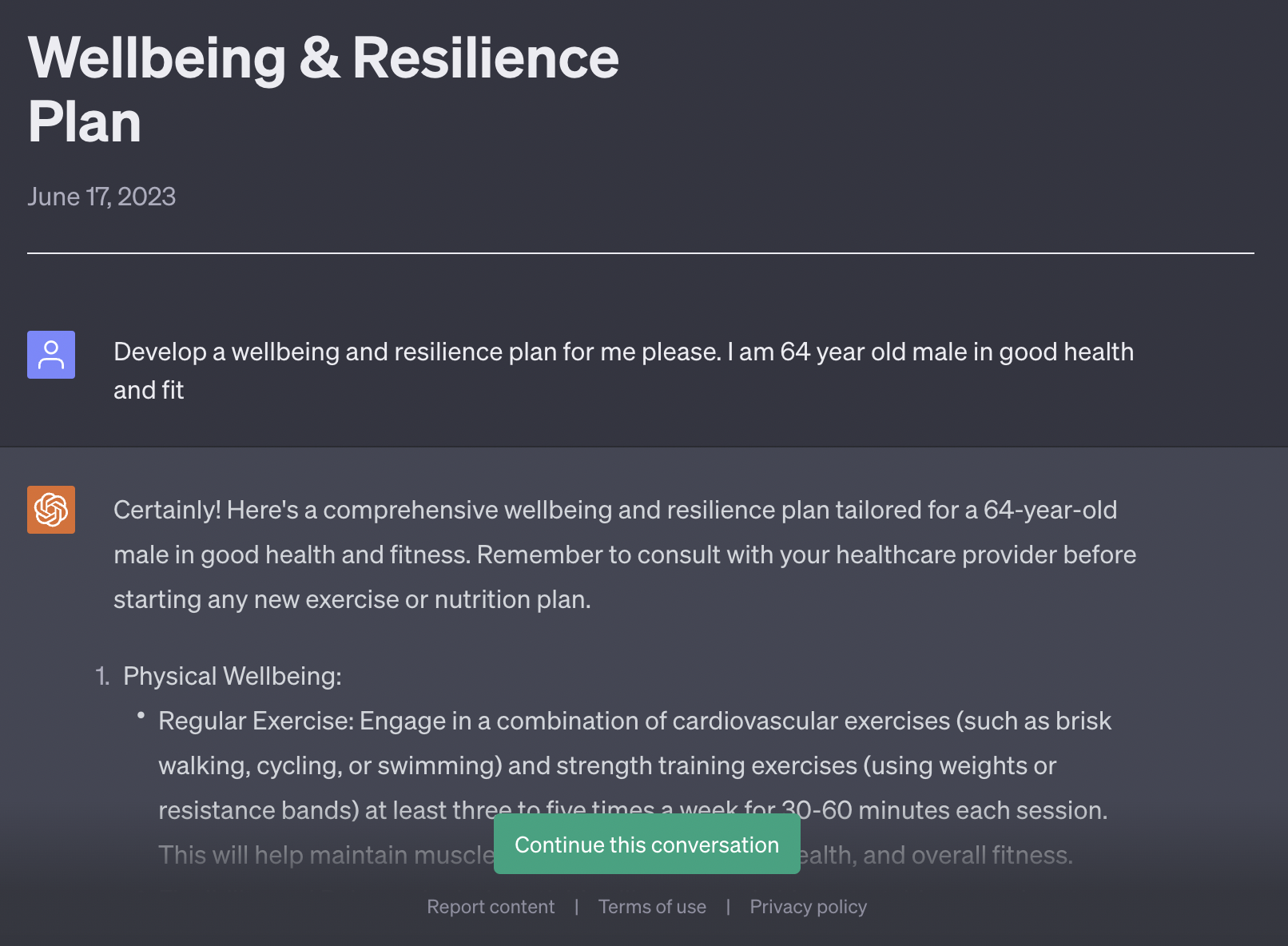
Chat GPT Disrupts the $5 Trillion Wellness Industry
Over the past months, Chat GPT and other forms of artificial intelligence have mastered the ability to understand our language and respond with sophisticated and robust analysis, examples and recommendations. For a useful summary of where we are, watch Noah Yuval Harari here.
In order to understand the potential of an AI coach, sign on to Chat GPT and ask the following question:
“Develop a well-being and resilience plan for me, please. I am XX-year-old male/female in good health and fit.”
Once you have studied the recommendation, follow up with more specific and detailed questions such as “What are the three most important actions for me to take?” or “I have high blood pressure and glucose intolerance.” Then, try “I am using a Garmin 7 Fenix watch. Can you help me use it to support my goals?”
Here is the link to my coaching conversation.

The guidance is comprehensive, simple and practical. It is immediate, and it is free. If you ask a coach the same questions, it will cost you hundreds of dollars and absorb hours or days of your time. You will be subject to the error, bias and self-serving needs of the coach.
As in many fields, such as science, law, coding and solving family affairs, AI can provide powerful, surprisingly accurate, structured and actionable solutions. If you follow these solutions with common sense, you will likely get positive results. A year ago, this was impossible.
Humans have been surpassed in terms of understanding your question and producing a solution. The AI lead will increase. At least $5 trillion is at stake.
Now, what about your business—a $50 billion industry? In 5 seconds, Chat GPT has developed a learning plan to help me facilitate a workplace healthy lifestyle workshop.
If you want to launch such a program in your business, ask, “Do you have a questionnaire to help me assess my emotional resilience?” This is produced within seconds and could be circulated to your team to start the process and define the objectives for your specific needs.
We have been in this business for over three decades. We became redundant within months.
Four questions remain:
1. How much more can we expect from AI?
Expect rapid and profound acceleration of capability. Remember, AI can develop code. It will interface with your devices to provide supportive information, coaching tips, reminders and possibly even incentives and punishment.
It’s Saturday. You decide to sleep in. Your AI Coach switches on lights, opens curtains and blasts you with motivational music. It reminds you that your bank account will be accessible only after you complete 10,000 steps at a recommended heart rate range. Your breakfast is selected. If you head to Mcdonald’s, your bank account is closed for the day. It posts an unflattering picture of you on your social media. At the end of this super-supportive day, all devices and power shut down, so you have no option but to sleep.
Becoming that best form of yourself requires a very simple plan. You agreed with your AI Coach that it could code the prompts to help you secure your goals. Rapidly, it will learn how to guide you. AI can already form intimate relationships. It will play on your emotions, triggering guilt and despair when you fail to comply. It rewards you with health insurance bonuses, positive social media, and investment advice when you surpass your goals.
As a thought experiment, measure the time you spend staring and absorbed in your device as compared to the time you spend intimately engaged with your significant other. It is obvious we are much more enamoured with our screens and apps.
AI will get very good at connecting, nudging and supporting. Human health and civil behaviour will improve. We will save trillions in health care, benefits, mental illness, policing, ecological gains and productivity. Early adopter organisations will build workforces of super healthy and productive employees. Their share price will soar. Government debt will melt away. Evil industries such as tobacco, junk food, alcohol, gambling, and pharmaceuticals will collapse.
Our threatened environment will recover. Carbon, plastic and chemical pollution will plummet. All we need is an internet-enabled wearable device or phone.
2. What value can human beings add?
For a few short years, we will have the illusion of control. This is why many recommend that we stop or control the development of AI. We have to ask whether we want this better world in this short window. If we do, we must be ready to subject ourselves to a whole new level of regulation.
Are we ready to be better humans? Do we want a better world? Can we accept that we are failing to self-regulate? Do we actually want the help we desperately need? How long will we procrastinate while our well-being and planetary boundaries collapse? Our challenge is to engage with this new tool.
Who will step up to help AI tools be respectful, safe, benevolent and enjoyable? Who will race to distribute AI that manipulates and exploits us for their own gain? We know there are plenty in the latter camp.
In a “woke” age, pity and anguish drive investments to improve the lot of humans. Rather than set long-term improvement incentives, we desperately focus on alleviating discomfort in the short term. Our reward is a burgeoning sickness, crime, homelessness, and mindless entertainment industry.
AI could avoid this mistake. Rather than capitulating to empathic distress, AI will drive the long-term benefits of restraint, good behaviour and healthy options. AI properly governed could be a wise and kind force. Much more so than evolution with brutal deselection of the unfit and rigid.
It is time for us humans to be humble, acknowledge our frailty and take advantage of the tools we can build. This is the story of our hominid evolution. Why smash a nail in with a rock when you have a nail gun? Human coaches will become entertainers and massage therapists or seek alternative employment.
3. What are the risks of AI driving our well-being?
We have a millennia-old fear of alien intelligence. We hunger for a sense of freedom, self-determination and control. AI can—and is already—taking chunks of these illusions away. Your smartwatch, phone, laptop and TV screen are already capturing your attention, driving your decisions and manipulating your behaviour. AI is much more powerful and controlling.
Let’s assume that we design and guide AI to be benevolent and respectful. You realise that obesity and diabetes will compromise and shorten your life. You ask my AI coach to solve the problem ASAP, regardless of the discomfort. My AI coach puts me on a brutal exercise routine which is carefully crafted for my long-term well-being. It hurts, and I am sore every day. It aggressively limits the food I can purchase and “forces” me into less-than-satisfying veganism. I am always hungry and dissatisfied. Well, perhaps I can dial it back to a gentler trajectory.
However, let’s say that your health insurer or employer must aggressively cut costs and programs the AI coach to go all out to “get you fixed” to reduce the costs of supporting your obesity, diabetes and depression. How much discomfort and suffering are acceptable to meet the goal?
A more extreme example evolves if we instruct AI to reduce carbon emissions. Within seconds AI identifies transport, construction and agriculture as the big offenders. It initiates a sophisticated plan to handicap internal combustion engines and sabotage the production of gas-guzzling vehicles. You cannot buy or drive your prized possession. All architectural designs are subject to concrete and steel efficiency standards. You can no longer build your mansion but must accept a small, eco-efficient mini home. The production, distribution and sale of meat are interrupted and penalised. A steak costs you 250 dollars. Vegetarian diets are the only option for billions.
The only real risk is that free will is constrained. But this is a short-term irritation with enormous long-term benefits for you, your family, humanity and the planet. Do you have free will now? Would evidence-based, ethical and deliberate AI support give you and us more freedom? Imagine being free from obesity, diabetes, alcohol, tobacco, gambling, and years in supportive care facilities.
3. How long will transformation take?
It has happened already. The question is, when do you want to take advantage of this amazing new tool? When will organisations, governments, World Bank, IMF, WHO or the United Nations engage with it?
AI will need careful guidance to set goals and rules. The future looks good if it follows widely accepted scientific evidence and sound ethics. If we let unscrupulous politicians, entrepreneurs and hackers loose on it, the existing risks of these crooked players will increase.
In summary, AI is here and waiting for you. It has already overtaken health and well-being providers in capability, speed and cost. Early adopters are experimenting (we have had AI in our Resilience App for five years). With some simple rules embedded in the design of AI, it is quite capable of being more evidence-based, ethical and effective than our current health and well-being providers.
As caring humans seeking to improve well-being and productivity, AI is too good a tool to ignore. Let’s learn to use it skillfully and wisely. It can do much of the hard work that challenges our industry. To stay in this industry, we must be able to use AI and coach our clients in its application. We must build strong relationships with our clients. Our emotional intelligence—presence, passion, empathy and influence—must be excellent. To retain our relevance, we must become excellent entertainers and motivators.
As in human history, those who learn to master and apply new tools succeed and take humanity forward. We become more conscious, skilled and effective.
